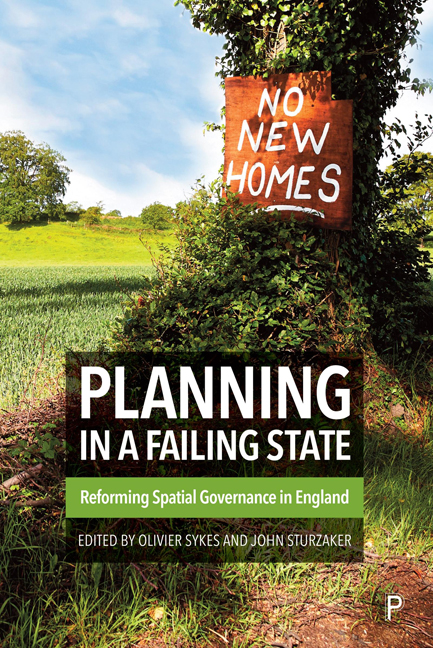Book contents
- Frontmatter
- Dedication
- Contents
- List of figures and tables
- Notes on contributors
- Acknowledgements
- 1 Introduction
- 2 The (housing) numbers game
- 3 Localism: the peccadillos of a panacea
- 4 Planning at the ‘larger than local’ scale: where next?
- 5 PD games: death comes to planning
- 6 Building beauty? Place and housing quality in the planning agenda
- 7 Zoning in or zoning out? Lessons from Europe
- 8 Planning and the environment in England, 2010–22: cutting ‘green crap’, Brexit and environmental crises
- 9 Stuck on infrastructure? Planning for the transformative effects of transport infrastructure
- 10 Conclusion
- Index
10 - Conclusion
Published online by Cambridge University Press: 27 March 2024
- Frontmatter
- Dedication
- Contents
- List of figures and tables
- Notes on contributors
- Acknowledgements
- 1 Introduction
- 2 The (housing) numbers game
- 3 Localism: the peccadillos of a panacea
- 4 Planning at the ‘larger than local’ scale: where next?
- 5 PD games: death comes to planning
- 6 Building beauty? Place and housing quality in the planning agenda
- 7 Zoning in or zoning out? Lessons from Europe
- 8 Planning and the environment in England, 2010–22: cutting ‘green crap’, Brexit and environmental crises
- 9 Stuck on infrastructure? Planning for the transformative effects of transport infrastructure
- 10 Conclusion
- Index
Summary
Introduction
As we discussed in Chapter 1, this book was prompted by the publication of the Planning White Paper in August 2020 and the ‘radical’ reform it proposed. That White Paper had forewords written by then Prime Minister Boris Johnson and then Secretary of State for Housing, Communities & Local Government Robert Jenrick. To say that the landscape has shifted somewhat since then would be an understatement. The White Paper has now largely been abandoned, with some of its contents included in a new Levelling-up and Regeneration Bill. The department of the UK government responsible for planning has been renamed as the Department for Levelling Up, Housing and Communities. At the time of writing in February 2023, the secretary of state in place at the head of that department is Michael Gove, who, precedent suggests, is unlikely to be in place when you read this, and there have been an astonishing six different planning ministers in the last 12 months. However, most significantly, the UK has had three different prime ministers during this period, with Liz Truss replacing Boris Johnson on 6 September 2022, leading to a record-breaking short period of office before being replaced by Rishi Sunak on 25 October 2022. All of this means that the proposals in the Planning White Paper are of little relevance to the future of planning in England. That does not mean, however, that this book is of no relevance; the opposite, in fact, is true, as its central ‘thesis’ that constant cycles of often ill-conceived central government reform and tinkering have failed to establish consistency and stability around planning seems more salient than ever.
The controversy generated by the Planning White Paper and the consequent loss of a by-election in Chesham and Amersham were arguably the beginning of the end for Boris Johnson’s premiership. While he was ultimately dethroned by his party due to other factors too numerous to detail here, the inability of his government to successfully introduce changes to the planning system illustrates neatly our argument that the ‘failure’ of this book’s title is not that of planning but that of the state within which planning operates, as well as the political party that has led that state for much of the last 50 years.
- Type
- Chapter
- Information
- Planning in a Failing StateReforming Spatial Governance in England, pp. 160 - 182Publisher: Bristol University PressPrint publication year: 2023

